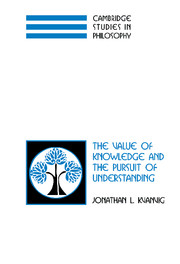Book contents
- Frontmatter
- Contents
- Introduction
- 1 The Value of Knowledge Is External to It
- 2 The Value of True Belief
- 3 The Value of Justification
- 4 Reliabilism, Normativity, and the Special Promise of Virtue Epistemology
- 5 The Gettier Problem and the Value of Knowledge
- 6 Knowledge as Irreducibly Valuable
- 7 Epistemic Attitudinalism: Semantic and Pragmatic Approaches
- 8 Knowledge and Understanding
- 9 Conclusion
- References
- Index
7 - Epistemic Attitudinalism: Semantic and Pragmatic Approaches
Published online by Cambridge University Press: 14 August 2009
- Frontmatter
- Contents
- Introduction
- 1 The Value of Knowledge Is External to It
- 2 The Value of True Belief
- 3 The Value of Justification
- 4 Reliabilism, Normativity, and the Special Promise of Virtue Epistemology
- 5 The Gettier Problem and the Value of Knowledge
- 6 Knowledge as Irreducibly Valuable
- 7 Epistemic Attitudinalism: Semantic and Pragmatic Approaches
- 8 Knowledge and Understanding
- 9 Conclusion
- References
- Index
Summary
The conclusion to which our investigation seems to be pointing is that ordinary thinking about knowledge is mistaken, that knowledge does not have the kind of value it is ordinarily thought to have. In particular, we seem to be heading for the conclusion that knowledge does not have a value that exceeds that of subsets of its constituents. Knowledge cannot be identified with intellectually virtuous, subjectively justified true belief, and it appears that its value does not exceed the value of this combination of ingredients.
Perhaps, though, we are missing what is right under our noses. Language is a perplexing combination of semantic and other features, and to this point, we have largely ignored features other than semantic ones. Moreover, within our exploration of the semantic features of the concept of knowledge, we have been assuming a descriptivist standpoint about knowledge. We have been assuming, that is, that the concept of knowledge applies to objective, factual features of the world. It is, perhaps, this combination of assumptions that leads us toward a pessimistic conclusion such as that there is no good answer to the problem of the Meno.
A different proposal is that the value of knowledge is found in certain attitudinal features involved in the concept or use of the concept of knowledge. One approach along these lines would involve making claims about knowledge that emotivists in ethics make about moral concepts. We might call this the “boo/hiss” theory of knowledge.
Information
- Type
- Chapter
- Information
- The Value of Knowledge and the Pursuit of Understanding , pp. 157 - 184Publisher: Cambridge University PressPrint publication year: 2003
